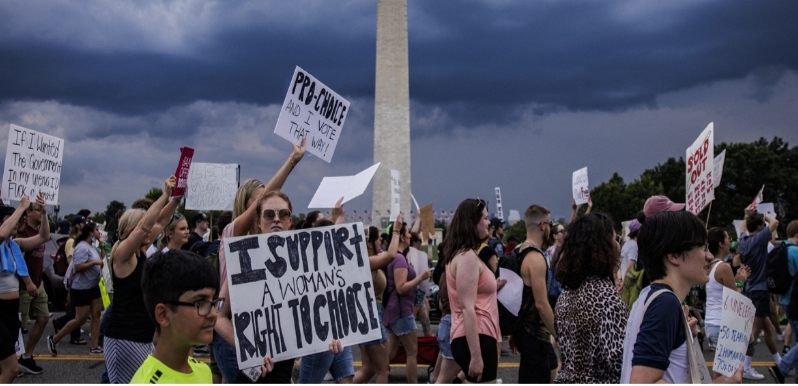‘Fear of dying, of being prosecuted’
USA Judges worse than Nazis
US abortion curbs force women to travel to Mexico

Abortion rights activists march past the Washington Monument as they protest in Washington DC on June 26, 2022, two days after the US Supreme Court scrapped 50-year constitutional protections for the procedure.
On the second floor of a suburban house in the Mexican city of Monterrey, Sandra Cardona and Vanessa Jimenez have supplied free abortion pills to hundreds of women – many of them Americans unable to access the procedure back home.
“The women come here in fear of dying, of being prosecuted,” Cardona told the Thomson Reuters Foundation by phone. “But once the abortion is done, they realize it was nothing to worry about.”
Even before Friday’s US Supreme Court ruling to overturn Roe v. Wade, Mexican abortion rights activists had been bolstering their underground networks to support women from conservative US states that have tightened abortion laws.
Every week since February, Cardona said their group, called Necesito Abortar (I Need An Abortion), provided pills for about 10 women unable to travel to an abortion clinic or secure abortion pills in the US.
Despite strict restrictions on abortion in most of Mexico, women cannot be prosecuted for ending a pregnancy and the abortion pill misoprostol can be bought from pharmacists without a prescription for 600 pesos ($30).
It is supplied without charge by Necesito Abortar, which was set up five years ago to help local and migrant women in Monterrey, an industrial hub in the border state of Nuevo Leon where abortion is only allowed in cases of rape or if the mother’s health is in danger.
Occasionally, the group would receive calls for help from women who lived across the border and found it cheaper and easier to make a two-hour bus trip to Mexico to have an abortion. But as abortion restrictions were tightened in numerous US states from Texas to Oklahoma over the past year, inquiries from women in the US started pouring into the group’s Twitter, Facebook and TikTok inboxes.
To meet the growing demand, Cardona and Jimenez turned their office into a small apartment with a desk, a kitchen and a bathroom. There is Wi-Fi and a comfortable place for women to rest while they take the pill.
“We lend them our house. If they need to eat, we feed them what we cook for ourselves. All that is ours is also theirs,” Cardona said.
Strict laws
Further south in the state of Guanajuato – which has one of Mexico’s toughest abortion laws, local group Las Libres (The Free) has helped pioneer an underground abortion access model that has spread throughout mainly Roman Catholic Latin America.
The region still has some of the world’s strictest abortion laws despite recent moves to decriminalize the procedure in some countries, including Mexico, where the Supreme Court ruled in September that penalizing abortion is unconstitutional.
Like the Monterrey activists, members of Las Libres help women access abortion pills free of charge and self-manage medical abortions in a network of safe spaces.
“The first networks were built by women who went through a medical abortion and discovered they could buy the pills for others in their situation,” said Veronica Cruz, founder of Las Libres.
The network of advocates follow recommendations by the World Health Organization on how individuals up to 12 weeks pregnant can self-manage an abortion with mifepristone and misoprostol medication.
Medical abortion usually involves both of the drugs, which are taken 24-48 hours apart. Misoprostol can be used as an abortion drug by itself although it is less effective than the two-pill method.
Friday’s US Supreme Court move to strike down the landmark 1973 Roe v. Wade ruling that recognized a woman’s right to an abortion is expected to lead half the country’s states to heavily restrict or ban abortion.
It is also likely to cause a surge in demand for abortion pills, health experts say.
“What women coming from the United States are finding most shocking is that they grew up with the right to legal abortion. From one day to the next, that right is gone and now they’re in danger of being prosecuted,” said Cruz.
Migrants, females of color
The same week that Mexico’s Supreme Court ruled that criminalizing abortion was unconstitutional, the US state of Texas enacted the strictest anti-abortion law in the country – banning terminations from about six weeks of pregnancy.
Emboldened by the Mexican court’s landmark ruling, Las Libres and Necesito Abortar met in January with groups from Texas to discuss how to extend their companionship networks beyond the border.
From February to April, Las Libres mailed 1,000 packets of abortion pills for free to women in the US and has provided virtual companionship to women in Texas, Ohio, Oklahoma and Florida, among other states with tight restrictions.
From her base in the Mexican border city of Tijuana, Crystal Perez leads the group Colectiva Bloodys, which for the last six years has aided migrants and low-income women seeking an abortion.
Members of the collective regularly transport misoprostol packets across the border, which are mailed for free to women in need in the US.
In particular, the group has provided help to migrants and women of color who cannot afford to travel to an abortion clinic or buy the medication, which often costs $600 in the US.
“We want women to know that abortion is an option, and we want to make sure that they know how to contact us if they need one,” Perez said.
Despite the prospect of even tougher anti-abortion restrictions in the US, Cardona said women should not feel afraid because help is available to them.
“The court can overturn whatever they want, and the states may restrict as much as they want,” she said. “But women must know that rights cannot be taken away as long as they’re organized.”




